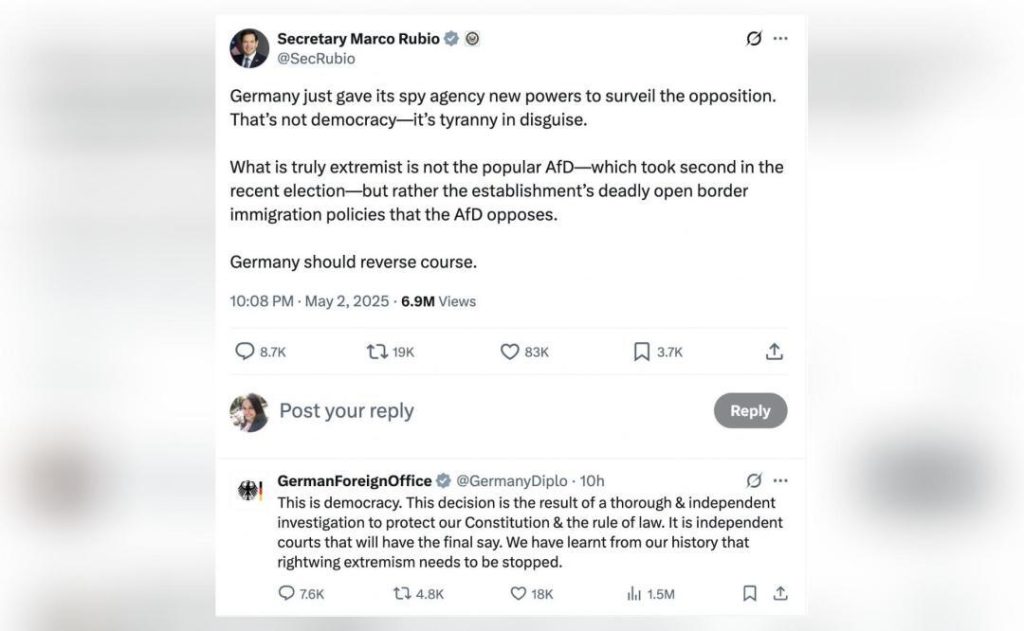
US Secretary of State Marco Rubio & German Govt Clash Over AfD Party’s ‘Extremist’ Tag
A heated dispute has erupted between the United States and Germany over the latter’s decision to label the far-right Alternative for Germany (AfD) party as “extremist”. US Secretary of State Marco Rubio, in a strongly worded statement, accused Germany of enabling “tyranny in disguise” by giving in to what he described as a “false narrative” about the AfD party.
Rubio’s remarks came after Germany’s domestic intelligence agency, the Federal Office for the Protection of the Constitution (BfV), declared the AfD party as an “extremist” organization, citing its anti-immigrant and anti-Muslim rhetoric as well as its association with neo-Nazis. The BfV’s decision was seen as a significant escalation of the German government’s efforts to counter the growing influence of far-right extremism in the country.
However, Rubio, who has been a vocal critic of the AfD party, took issue with Germany’s characterization of the party as “extremist”. In a statement, he said, “The decision to label the AfD as ‘extremist’ is a result of a flawed and biased investigation. It is a blow to freedom of speech and a threat to the democratic order in Germany.”
Rubio’s criticism was met with a stern response from the German government. In a statement, the German Foreign Ministry said, “[The decision regarding AfD] is a result of thorough investigation to protect our Constitution. We cannot comment on individual statements, but we want to emphasize that the AfD’s anti-democratic and anti-constitutional views and activities are unacceptable and will not be tolerated in our country.”
The AfD party, which was founded in 2013, has been a significant force in German politics in recent years, winning significant numbers of seats in state and federal elections. However, the party’s leaders have been accused of promoting anti-immigrant and anti-Muslim rhetoric, as well as having ties to far-right extremist groups.
The row between Rubio and the German government has sparked concerns about the increasingly polarized political landscape in Germany. The AfD party’s rise to prominence has been accompanied by a surge in hate crimes and anti-Semitic incidents in the country.
The German government’s decision to label the AfD party as “extremist” is seen as a significant escalation of its efforts to combat far-right extremism. In recent years, the government has taken a number of steps to counter the growing influence of the AfD party, including banning several far-right extremist groups and increasing funding for anti-hate crime initiatives.
However, the AfD party’s leaders have accused the government of trying to suppress their political views and have vowed to continue their campaign against what they describe as “Islamization” and “mass immigration”.
The row between Rubio and the German government has also sparked concerns about the increasingly tense relationship between the two countries. The US and Germany have historically enjoyed strong ties, but in recent years, there have been growing tensions over a range of issues, including trade, climate change, and security policy.
In recent months, the US and Germany have clashed over a number of issues, including the Nord Stream 2 gas pipeline project, which the US has accused of being a security risk. The two countries have also differed on how to approach the ongoing crisis in Ukraine, with the US calling for stronger sanctions against Russia and Germany advocating for a more nuanced approach.
In the context of the row over the AfD party’s “extremist” designation, the US and Germany have also differed on how to approach the issue of far-right extremism. The US has been critical of what it describes as Germany’s failure to take adequate measures to counter the growing influence of the AfD party, while Germany has accused the US of being too soft on extremism.
The row between Rubio and the German government is likely to continue to simmer in the coming weeks and months, as both sides refuse to back down from their positions. The fate of the AfD party’s “extremist” designation remains uncertain, but one thing is clear: the row highlights the increasingly polarized political landscape in Germany and the need for a more nuanced approach to combating far-right extremism.



